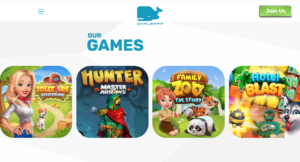Interview with Ziv Kitaro | Director of Product Management and Business Development at Whaleapp
 We met up with Ziv Kitaro, Director of Product Management and Business Development at Israel-based game developer Whaleapp, to find out more about the gaming industry and about music for games. We gathered a few insights along the way as to how best to approach establishing yourself in the industry..here’s a sneak preview of the interview. Full podcast of the interview coming soon. Subscribe so you don’t miss new episodes.
We met up with Ziv Kitaro, Director of Product Management and Business Development at Israel-based game developer Whaleapp, to find out more about the gaming industry and about music for games. We gathered a few insights along the way as to how best to approach establishing yourself in the industry..here’s a sneak preview of the interview. Full podcast of the interview coming soon. Subscribe so you don’t miss new episodes.
Industry overview
I think it’s important to understand the structure of the gaming industry.
So first of all there are the AAA studios…With that part we’re talking about very high quality, very complex games. We’re talking about tens of millions of dollars going into production. If you come in fresh out of the pond, so to say, it isn’t likely that you’ll be able to get yourself into those AAA games.
After that you have the mid ground – high production value, short games, something that will cost a couple of million. Usually those medium kind of studios will work with some external composers and an orchestra, depending on what type of music they’re looking for.
And below them I’ll put what we call today the mobile game industry. And while you look at the amount of money and the amount of people that mobile games are touching, it’s a huge percent. And you have various degrees of companies from huge companies like King, to small indie studios. So the variety here is huge. But more importantly, unless you’re talking very level…you’ll probably have a better chance of getting started in the industry if you go with mobile.
When you start with mobile, you start with a very small company and very specific kind of experience which you want to create. If you can prove yourself there, if you can give the audience the kind of experience in that genre, you’ll learn a lot of tools that can be used when you go up to the higher echelon.
“When you start with mobile, you’ll learn a lot of tools that can be used when you go up to the higher echelon.”

Do you think it’s necessary that the composer is a gamer?
In general I would say no, not necessarily. It’s more important that the composer has experience or love for the genre.
…you have a lot of restrictions on mobile so you need to be creative. And it also opens up a lot of opportunities right because you need to find out like how can i create that kind of theme that kind of feeling when all i have is not only that it has to be short! I also have to deal with the fact that maybe people are listening on their headphones but maybe they’re not and as good as the speakers. For any mobile phone, these are not premium. You don’t have the bass at the very least, right, but still you have to create music that sounds good on those. And that’s maybe the more important thing than being a gamer understanding the technology, understanding where your music is going to be played. It’s as important as understanding the genre. And you know you ask also like what are other things that composers might need to understand… uh game engines are something that you should dig into. There aren’t many of them so again you go to mobile. That’s another reason to start there because it’s easy, you’ll have three engines.
“It’s more important that the composer has experience or love for the genre.”
When you understand the engine and you understand limitations and you really understand how to work with that, it gives you an edge because I get a lot of emails – I’ll say two at least every month from composers – asking you know I’m looking to to do a project and some of them also write in the email you know I’ve worked with unity, so when someone writes to me and tells me you know I’m a composer and I already worked with unity, I’ll put them in the folder of people to to get back to.
“When you understand the engine and you understand limitations and you really understand how to work with that, it gives you an edge…”
We’ll share the full interview soon on our podcast series, which you can hear on our Google, Spotify and Apple Podcast channels. Subscribe so you don’t miss new episodes.
Interviewed by Bryan Waters
Edited by Yelyzaveta Dembovska
May 2021
Footnotes from Ziv:
1. My breakdown of the industry was very rudimentary. My focus was mainly on the commercial aspects. We didn’t touch the whole indie part of the industry which like mobile would be a good place for composers to jump in. I think it’s a good point to add and remember.
2. I forgot to mention Game jams. These are (usually) 1-2 days events where people create games and fame like experiences with focus on creativity and not polishing a product. It’s a good place to offer your talent and get into games.
 Whaleapp is a global company with over 500 professionals worldwide, committed to taking the game industry to the next level. From casual to mid-core games, their team is devoted to crafting compelling content that can cater to any player’s needs, and heart’s desire. Their portfolio of mobile games consists of a variety of genres.
Whaleapp is a global company with over 500 professionals worldwide, committed to taking the game industry to the next level. From casual to mid-core games, their team is devoted to crafting compelling content that can cater to any player’s needs, and heart’s desire. Their portfolio of mobile games consists of a variety of genres.
